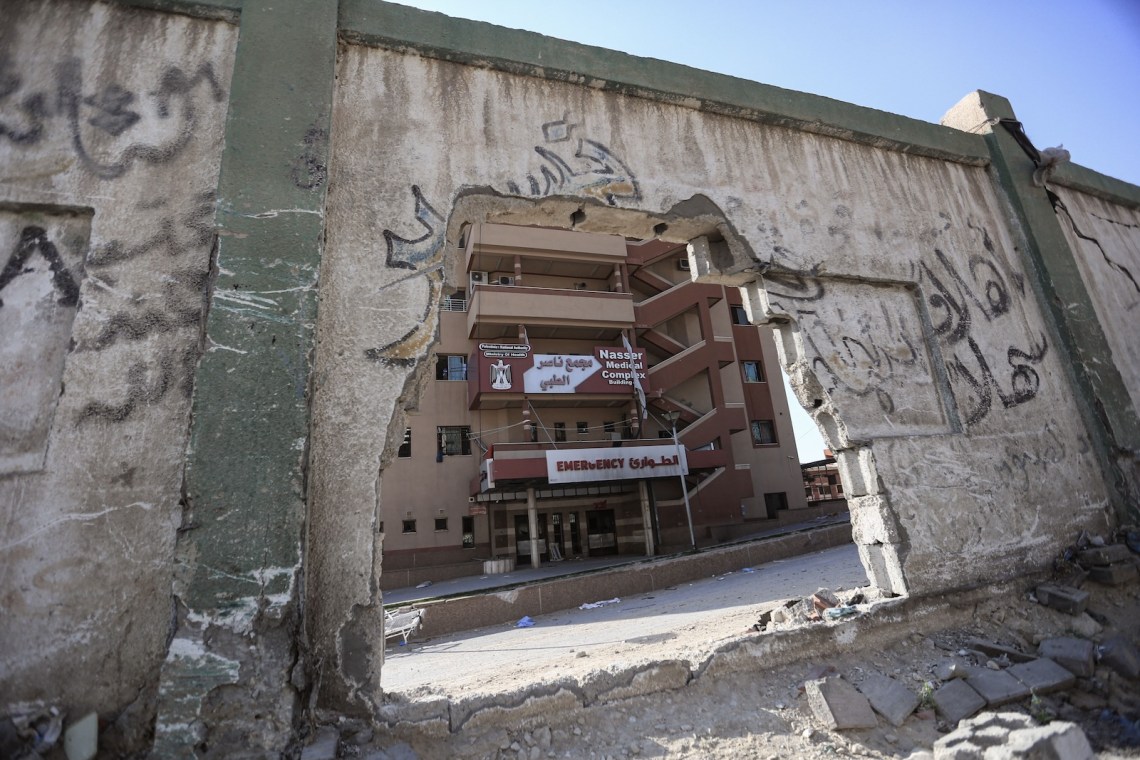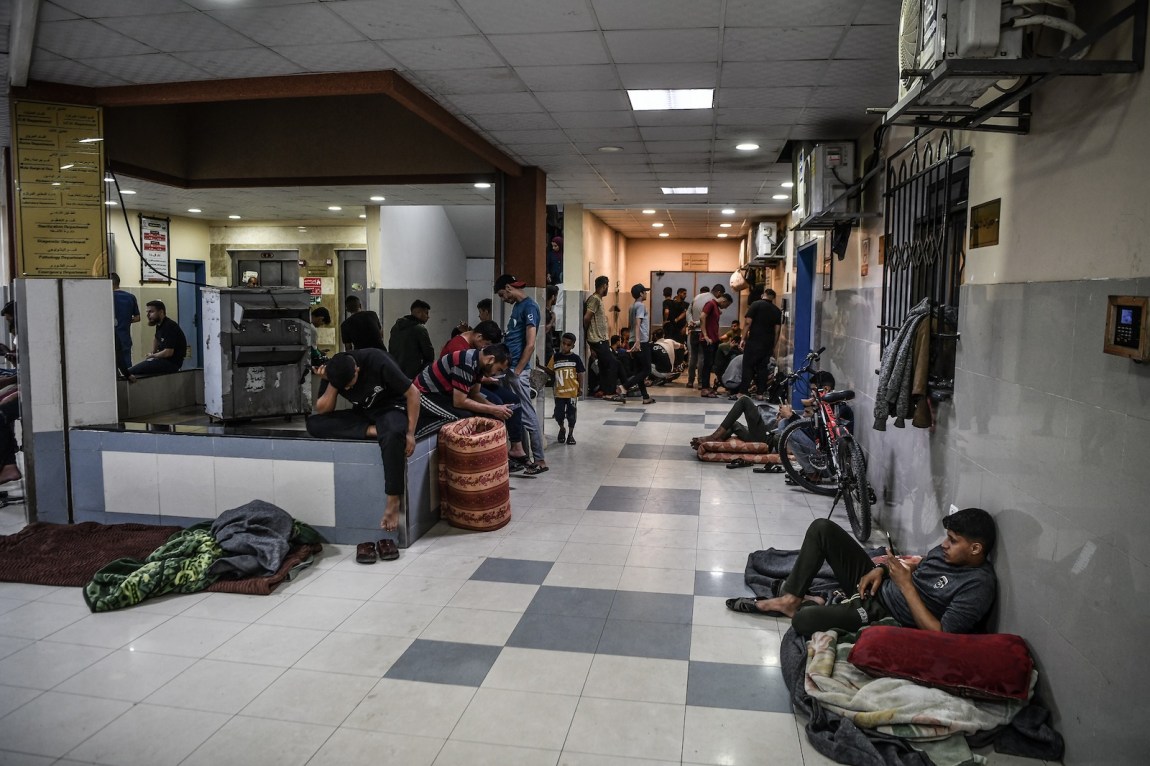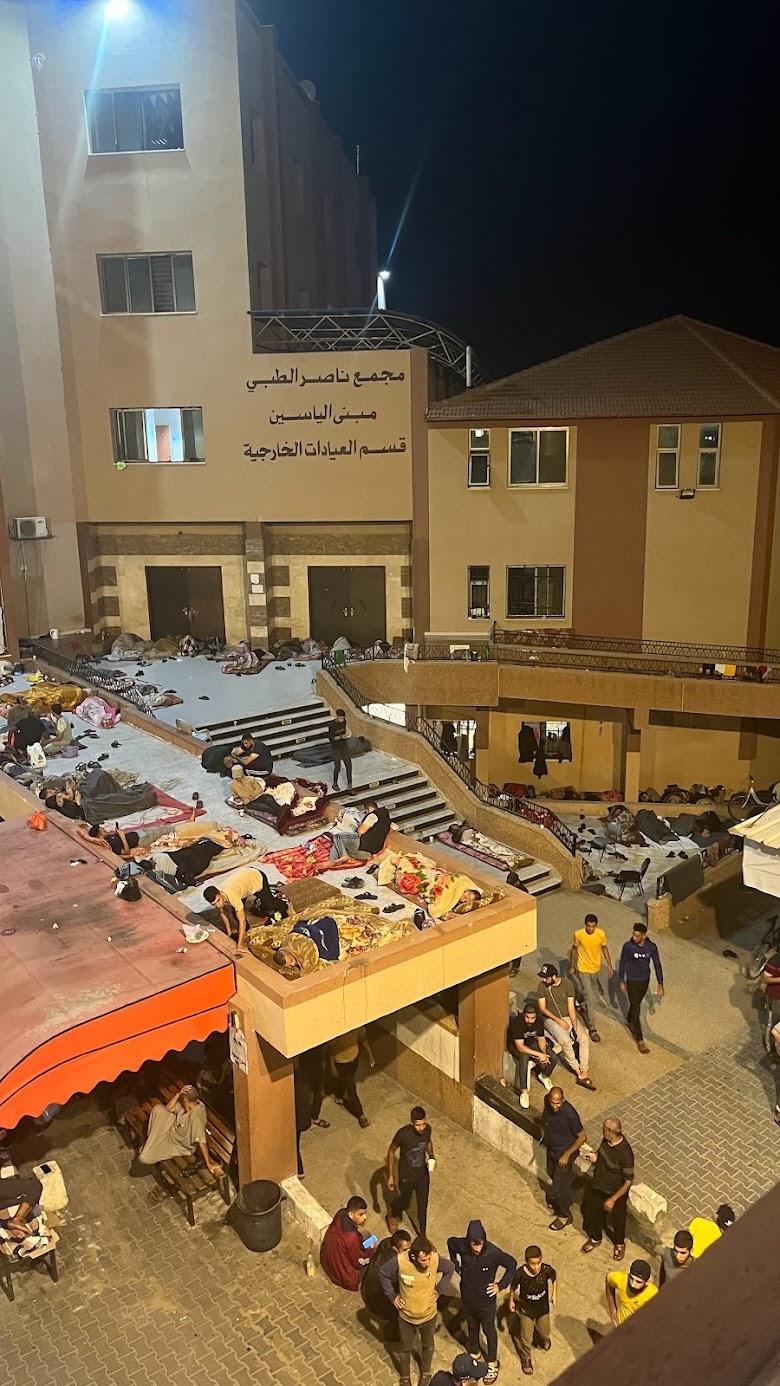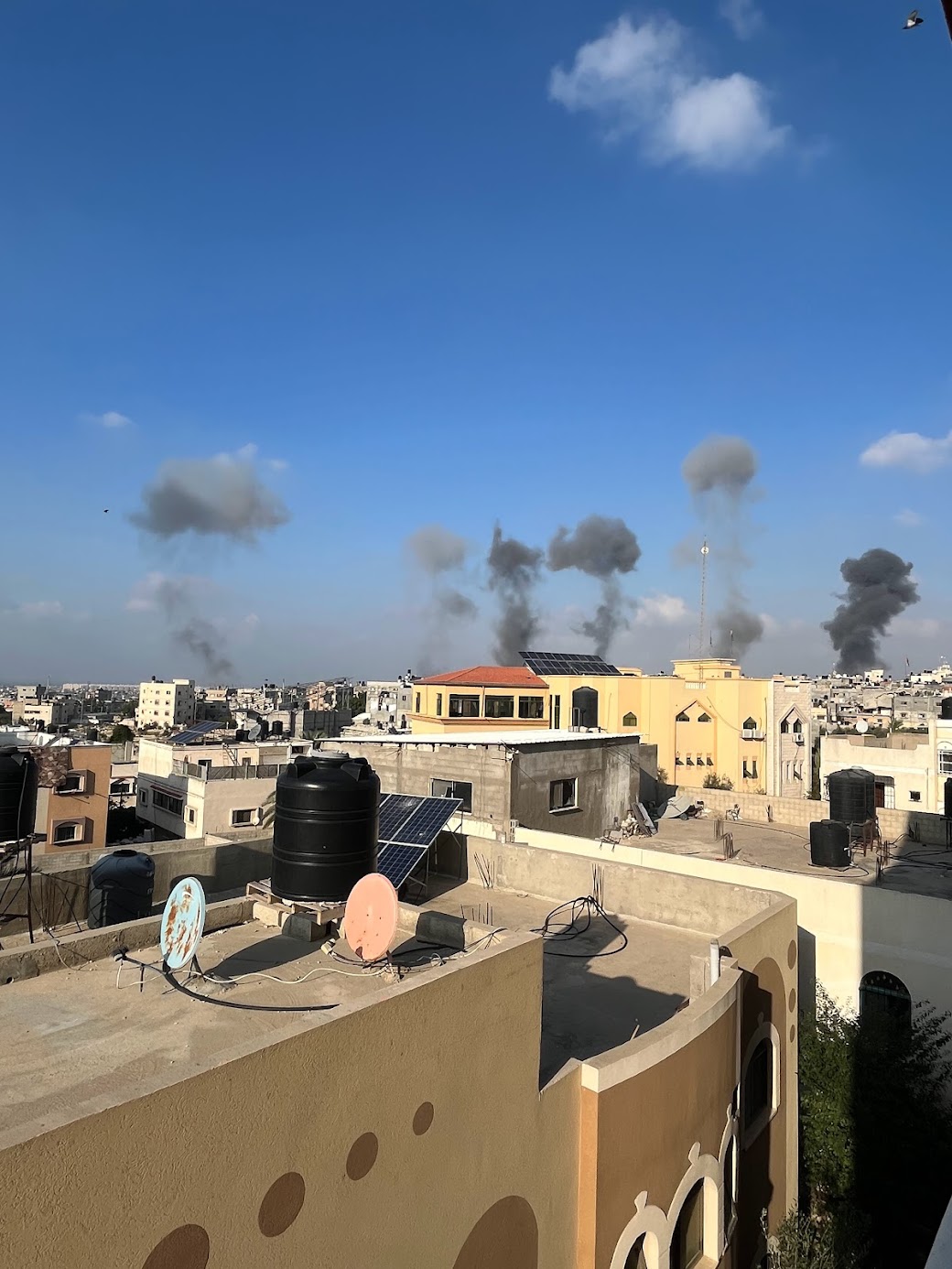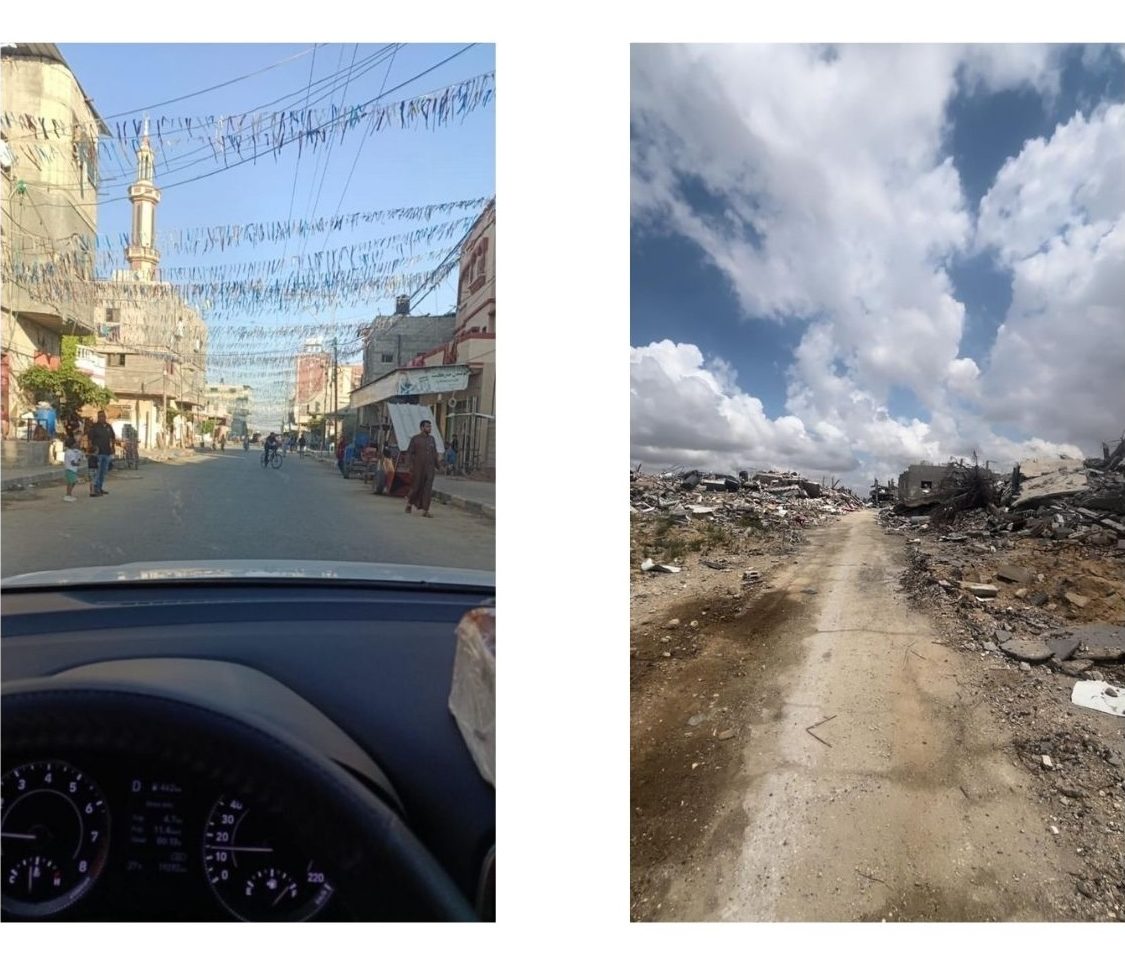I was born in the spring of 1999 in the village of Khuza’a, east of the city of Khan Younis, in the Gaza Strip. My family comes from a village called Salama, near Jaffa on the Palestinian coast, from which they were displaced by Zionist forces in 1948. Khuza’a was a place of green fields and flowers, far from the city center and close to the border fence that separates Gaza from Israel. Most of its residents worked in agriculture or made traditional crafts, but our family ensured that us five siblings—three sisters, a brother, and myself—received a good education.
We grew up among wars: 2008, 2012, 2014, 2021. The main camp of the Great March of Return—the protest movement violently suppressed by the Israeli army in 2018—was less than 350 feet from our home. Our school was run by the United Nations Relief and Works Agency (UNRWA). Since it, too, was just feet from the fence, our classes would be interrupted for hours, sometimes days, by shelling from tanks and gunfire from the watchtowers. Often UNRWA workers would pick us up from school in their cars and evacuate us to safety. Many of our classmates and friends were killed, usually while working with their families on farms adjacent to the fence. At school we mourned them by leaving wreaths of flowers on their empty seats.
In 2017 I finished high school and enrolled in medical college, where I led the student union, joined the organizing committee for Gaza’s first international multidisciplinary breast cancer conference, organized a campaign to pay off medical student debt, and facilitated the first student exchange agreement between my university and one in Istanbul. I graduated last year and started planning for the future. Friends and acquaintances suggested I leave Gaza, pursue education abroad, then come back home to work in one of the specialized medical fields that suffer many shortages. To that end I got ready to apply to study in the UK. (My sisters went into dentistry, psychology, and nutrition; my brother is still in high school.) What’s beautiful about the people of Gaza is that we always plan and plan again. We knew that any Israeli invasion could nullify our plans, but we lived and grew on hope.
*
The war has changed everything. By the second day, October 8, the Israeli Occupation Forces—calling them “Defense Forces” would be inaccurate—were bombing our neighborhood indiscriminately, mostly with ground shells but also with airstrikes. That day we lost a neighbor and his entire family under the rubble. My parents, siblings, and I were left with no choice but to leave and stay with relatives in Bani Suhaila, closer to the city center.
Right away I volunteered to work in the emergency department of the Nasser Medical Complex, the largest hospital in the southern half of Gaza. We triaged patients based on the severity of their injuries, then treated them: stopping bleeding, stitching wounds, splinting fractures, checking for internal bleeding, ordering X-rays and laboratory tests. Because our relatives had little space and the workload at the hospital was heavy, I had to live there. We saw an immense range of injuries: severed limbs, crushed skulls, skin peeled off, burns covering entire bodies, torn-apart children.
I don’t recall receiving just one or two patients at a time; each airstrike injured dozens of people. One day a pregnant woman arrived with head trauma, fractures in both feet, and collapsed lungs. It was clear that she was dying, and the ICU doctors decided to perform an emergency cesarean section immediately, even though they had no more anesthesia. They delivered the baby, who went to the neonatal intensive care unit. The mother struggled for life in the ICU for ten days until she passed away. Her husband, too, had died in the strike; only the child survived.
It became routine to receive patients who had been disfigured beyond identification, or to see children who were the sole survivors from their families, or to leave a dying patient for the sake of treating someone whose life could still be saved. At the same time we tried to stay alert to news of the bombardments and their locations, struggled to stay in contact with loved ones, scrutinized the emergency arrivals for fear that family and friends might be among them.
All too often they were. One day we received a great number of injured patients. Among them was my cousin Tareq, who had been a neighbor in Khuza’a. I had to dress his wounds, reassure him, calm his fears. Another day I received a lifeless body. As I wrote the death certificate, I realized that it was Abdulrahman, my collegemate and colleague at the hospital. I uncovered his face—it had been scarred by rockets, but how could I not recognize him?
Advertisement
The hospital had transformed into a shelter. Thousands of displaced people were packed into the building; they slept in courtyards, corridors, and patient rooms, lined up for the bathrooms and power outlets. To reach the emergency room during my night shifts, I had to jump over sleeping bodies.
We ate badly. Each day lunch was rice and dinner a piece of bread with cheese. After two months, when bread became scarce, we ate canned beans with a spoon. As the war progressed, more resident doctors arrived at the hospital. Often there were so many people in the facility that we slept on the ground without mattresses. In these conditions, diseases spread. People would wake up with respiratory infections one day and gastrointestinal sickness the next.
Meanwhile we had to try to provide for our loved ones. My mother would call me, her eldest son, about the lack of bread at home; I often left the hospital in my scrubs to queue for bread, water, and gas. Each week I stole two or three hours to check on my family in Bani Suhaila. During one of those visits, three missiles from an F16 aircraft hit the building where they were staying. Luckily the rockets didn’t explode, but a fire broke out and the staircase collapsed. We had to throw my three nieces from the third floor to neighbors outside who caught them. I thanked God that I had been there. If I had learned about the fire from the hospital, I would have been paralyzed with helplessness.
In the middle of the war I still applied to postgraduate programs at three universities, two in London and one in Aberdeen, as well as a master’s degree scholarship from the British consulate. I remember sitting on the street on a cold day in December, trying to catch a Wi-Fi signal so I could find out whether I’d been admitted. I got into all three programs and was nominated for the scholarship, but a few days ago my application for the scholarship was canceled; it required a time-sensitive visa application and an in-person interview.
*
On December 1, after the end of a temporary humanitarian ceasefire, the IOF went berserk. As the bombardment grew dramatically more intense, my parents, siblings, and aunts had to leave for Khan Younis. Since practically everyone in Bani Suhaila had done the same, the city was packed. I tried and failed to find them shelter. For five days they slept on the ground in a schoolyard without bedding or covers, exposed to the sky. They barely ate anything and drank water sparingly to avoid needing the restroom, for which dozens of people were lined up.
Meanwhile, in the emergency room, there were neither empty beds for patients nor sufficient medical staff to deal with the injuries. Sounds echoed in my ears: a father’s cries over his son buried under the rubble; a mother’s wails over her child, whose hand was all she managed to save; senior emergency personnel telling us to “let him die in peace” about a patient for whom there was no bed and no staff to treat his severe injuries. I saw maggots coming out of the wounds of people who had been trapped for days in the hospitals farther north after occupation forces had stormed the facilities and arrested the medical staff. As the high-priority cases piled up, we ran a higher risk of losing many of the injured, who could have survived had we treated them in time.
It was the worst I’ve ever felt. I was powerless both at the hospital and in front of my family. On the fifth day, at the peak of my helplessness, tears streaming down my face, I retreated to a corner of the operations floor, and began calling all the numbers in my phone until I found shelter for my family. At “M” I reached a friend in Rafah whom I hadn’t spoken to in five years and explained the situation to him. He offered to host my family, but not me. There were other families staying with him, and space was tight. I didn’t object. What mattered was my family: in the schoolyard they would either have been killed by shrapnel or from the cold or lack of food.
But my mother refused to move without me. Our communications networks kept getting disrupted; she insisted we stay close. I had to decide whether to stay at the hospital while my family lived in the schoolyard or leave the hospital—and with it the injured people whose lives I saved, the mother I reassured about her son, the father I guided through his terror—for another one close to my friend’s house, where my family could live. I chose to leave.
Advertisement
*
Now I volunteer around the clock at Kuwaiti Hospital in Rafah. I’m burning from the inside. At most I sleep five interrupted hours in a day and I eat canned food all the time. My muscles spasm, my back is curved, and that cursed feeling of helplessness still haunts me.
A kidney dialysis patient comes to me with complications; a diabetic patient comes to me in a coma because he couldn’t find his insulin; a hypertensive patient comes to me with his brain about to explode because he can’t access his medication; a neurological patient comes to me in a state of convulsion that will suffocate him one day because his medication is unavailable; an asthmatic patient comes to me every night suffocating, blue, because his inhaler is gone and smoke is spreading from the fires that people use to cook food and heat water in the absence of electricity or gas. Then there are all the injuries from the shelling itself.
Hospitals have become our homes. They gathered us under their roofs; we slept in their rooms and corridors. Every corner holds memories for us, the kind that take over the heart. It’s not easy to live here amid suffering, to work under continuous military attack, to wake up and close your eyes to the sight of the injured and corpses. We need to gather our strength to bear it all. I don’t know where the strength comes from.
What has the war done to me? How have I turned from a medical intern full of dreams into someone who must endure this agony, to see the sick every day and night, to announce patients’ deaths, to deal with cases more complex than I had ever imagined? All my plans have disappeared. My mother, father, sister, and brother are still at my friend’s house; my married sister and her three daughters live in a tent. Until the occupation withdrew from Khan Younis, we could only get information about the fate of our village from the social media accounts of the IOF soldiers, who bragged as they demolished our homes, streets, playgrounds, and mosques, as if it were a game. When I finally went back I saw that our house and neighborhood had been completely destroyed, leveled to the ground, wiped off the map. Not a single building was left standing.
Now my goal is to help my family, to find a roof to shelter them. Two months ago I started a crowdfunding campaign to raise money to rebuild our home. But the suffering still weighs heavily on me.
On October 17 I took a patient with multiple fractures to get an X-ray. More than thirty injured patients had arrived after the IOF shelled an inhabited house. Then I found people crowded around the television, which was showing footage of al-Ahli hospital in flames. My legs gave way. I fell to the ground and curled up in a corner crying.
Since then the IOF has struck, besieged, and raided most of Gaza’s major medical centers, including Nasser. Before they invaded the facility, I heard from my colleagues that the occupation forces were targeting anyone moving inside. When the invasion started, I learned, doctors were confined to certain areas and blocked from reaching patients elsewhere in the building; food and drinking water ran out; wastewater overflowed in the wards; the electricity cut out. Some of the colleagues with whom I was in touch, including a doctor and a pharmacist, were arrested; we haven’t heard any news about them. Nasser became a health hazard unfit for any kind of medical care.
Since the start of the war, 485 medical workers have been killed in Gaza. Twenty-six hospitals and sixty-two health centers are out of service, including the Indonesian Hospital in Beit Lahia, al-Awda in Jabalia, al-Amal in Khan Younis, and al-Shifa in Gaza City, where the army left behind hundreds of bodies in a mass grave. What kind of occupation are we dealing with? It doesn’t spare children, or old men, or women, or the injured—or even the dead.


